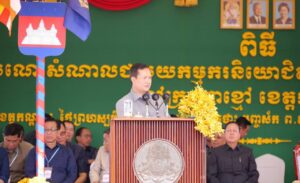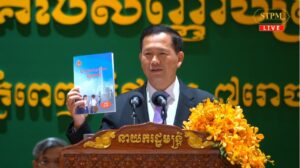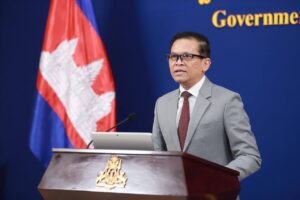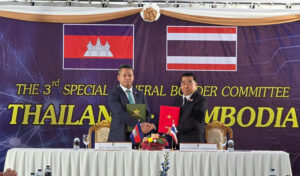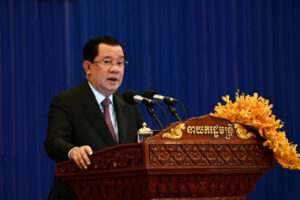Statement by Prime Minister Samdech Thipadei Hun Manet on the “One Year Achievements of the Royal Government of the 7th Legislature of the National Assembly” [Unofficial Translations]
[2]
In this regard, I would like to emphasize that ensuring the integrity and justice of the youth is to ensure equality in the competition, first of all, in building a clean and competent civil service base, which is the foundation for reform. In fact, in the seven exams, there were 80,000 candidates, of which we selected more than 2,000, and the process has been highly applauded and recognized as the efforts of the Royal Government in achieving the set goals, which is to ensure equal opportunities for our youth.
[3]
I have received information from many people who are happier and more confident in the state health service providers, especially health centers, related to providing quality services as well as medicines to the people. I would like to take this opportunity to thank all the doctors who have worked hard to better serve the people. We will continue this work to make sure that the service quality provided by district referral doctors and hospitals at all levels are more efficient, and gaining trust of the people. In the last 12 months, I have also put into official use numerous major achievements in the field of health, including the 9,000-bed Techo Santepheap National Hospital, the Techo Sen Koh Thom Hospital, and the state-of-the-art surgical services building at the Siem Reap Referral Hospital […]
[4&5]
In relation to that, let me provide a brief overview of intervention measures and solutions to a number of priority areas, including the local economy, land, and border development. Regarding the unused land tax in the past which has concerned many people, I have decided to announce, in the private sector forum, the exemption of unused land tax for land under five hectares in one place. This means that people with less than five hectares of land are not worried about the tax on unused land.
[7]
On June 19, 2024, the Ministry of Economy and Finance issued the Prakas No. 360 on the implementation of the sub-decree on tax incentives for informal economic development. This Prakas is designed on the good purpose to mobilize people in the informal economy to register voluntarily in order to be able to receive the benefits, such as training and capacity building, provided by the Royal Government, without any tax. However, when this Prakas is posted, (it turned out to be) confusing, causing many people to worry that the registration will lead to tax collection or tax fines in the future.
In order not to be confused, I have given the principle to the Ministry of Economy and Finance to repeal this proclamation and discuss with all stakeholders on how we can enable people in the informal sector to benefit from our political programs that we have issued for them. Generally, help can be offered only when we can identify the target group. So, in order not to have any doubts, fears or misinterpretations of the original meaning of this Prakas, leading to confusion and fear among the people, especially small and informal traders, (I have decided to) repeal it right away.
I would like to briefly declare that traders with a gross income of less than 250 million riels – in micro scale – are not obliged to pay any tax, that is, they do not need to be taxed, patented or make tax declaration. Let me say it in short like this.
[8]
Regarding tourism, especially in Siem Reap, we have a number of important acters and tasks that need to be addressed to help promote tourism there in addition to tax rules. The first is related to the tour guides, who are the main acters in introducing national and international guests to the history of the temples, as well as explaining the historical situations. I used to send a special team to meet informally with the people there to see what we could do to help since the implementation of intervention measures need to consult with those who actually carry it out.
We think strategically on a large scale, but we need to address issues in a relatively small feature. I always say that one or two leaves can clog a drain or slow down the flow of water. To solve these small problems is the main issue to consider. So, relating to our tour guides […] the request for a waiver of the transitional fee in cash for the expiration of the tour guide license, which we have waived, after the Covid-19 crisis, through to the end of March 2024.
To ease this burden further on tour guides, I have decided to extend the deadline until the end of 2024. As for the fine already paid, it will not be refunded. Still, this extension will help many.
[9]
As a result, Lok Chumteav Phoeung Sakna, Minister of Culture and Fine Arts, discussed with experts and asked for a consensus. I have given the following approval. The current situation is that Angkor Wat is open (for visitors) from 5 am through to 5:30 pm. The temple closes at 5:30 pm only for new visitors. The guests who are already in the temples are allowed to stay and leave gradually until 6:30 pm.
As for the Temples of Prae Roub, Phnom Bakheng, and Phnom Krom, which are popular with tourists at sunset, and which currently open at 7am and close at 7pm. For other temples, the opening hour will be from 7am through to 5:30pm. The purpose is to maintain the safety of the temple and visitors in order to give tourists enough time to prepare to leave the temple slowly until the sky is dark because some temples are large. After the discussion conducted by the Ministry of Culture, which I agreed upon, we made the following adjustments.
First, for Angkor Wat, the opening hour has been adjusted from 5am through to 6pm. Second, the Temples of Prae Roub, Phnom Bakheng, and Phnom Krom, we are operating the visiting hour from 6am to 7pm, which means we are opening one hour early. Separately, for other temples, which we open at 7am and close at 5:30 pm, the new time allowed is to open from 6am and close at 6:30pm.
However, the opening and closing times may vary depending on the season, such as the sky falls dark quicker from November to May, and the sky stay clear longer from June to October, with the aim of keeping the temples and visitors safe. The Ministry of Culture (and Fine Arts) must announce and implement this principle in due time.
Nowadays, foreign tourists buy tickets and have to go through many procedures, including taking photos, wearing cards [10], sometimes there are checking (done) when there were visiting the temple grounds, which can affect the mood of the guests. That is not to blame our officers as it is an obligation and a duty to do. We need to correct the procedure, however. We should consider think of replacing the procedure that will allow us to avoid taking pictures and making a card with the procedure reported to me by (Deputy Prime Minister and Minister of Economy and Finance) HE Dr. Aun Pornmoniroth. (We) have been thinking about a number of options, including a bracelet with a barcode on it or a QR code in the phone that customers do not need to take photos and hang the cards around. Let us find a way to make better.
These are the small points that affect the big work. If we rectify these small points, I think we can facilitate the tourism in Angkor better. We can facilitate the tour guides by taking into action the principles that I have suggested above so that they (the tour guides), the national and international tourists, and those who want to take pictures in the Angkor area can have a good experience with simple procedures. At the same time, it is also easier for the Apsara Authority officials to implement, because if the conditions are simpler, the inspectors will be able to focus less on inspection jobs and more on major works such as to maintain the safety of temples and tourists there.
[11]
To protect the national heritage, which is the heritage of our ancestors, is our duty indeed, but attention must be paid also to the changing lives of the people in the area, to say in a way, to put out the fire, not to fan the smoke. This means we must examine the root of the problem, identify the areas to be protected, the definitions, as well as some conditions so that we can achieve a balance between the protection of heritage sites and the living needs of the people.
[12]
In addition, during the 19th Government – Private Sector Forum on November 13, 2023, the National Bank of Cambodia decided to reduce the reserve requirement rate of the bank institution from 9% to 7% until the end of 2024. As a result, the banking system has more than US$ 1 billion in cash released into the economy. To facilitate cash flow in the economy, the National Bank has decided to allow this policy to continue until the end of 2025.
[15]
We can eliminate two problems at once. First, for the people who really lack land, […] to increase efficiency and momentum in helping them in a timely manner, we are setting up a national mechanism chaired by the Prime Minister and a secretariat mechanism to do this effectively, with accuracy and integrity, to ensure that the landless people will benefit. At the same time, the participation of these people will be helpful in protecting the natural areas and other state lands in which they settle. The design of the program also takes into account the northeast and a number of other areas that need protection of natural resources as well as promotion of the country’s development. Therefore, in relation to this work, we will prepare an implementation principle, hopefully, it can be implemented by the end of 2024 […]
I would like to take this opportunity to announce that I have decided to initiate the establishment of a “Border Infrastructures Construction Fund” (BICF) with two goals: (1) to raise additional funds, and (second) to provide opportunities for people across the country to participate directly with the Royal Government in the construction of physical infrastructures along the border, focusing especially on the border ring road. Therefore, I call on all our compatriots to join me in this cause [17] to work together to build a border ring road in order for us protect our territorial integrity together.
[18]
To address the concerns of the people about the development of the four northeast provinces, as our compatriots have seen already, we have put into actions the initiatives and political programs above, and they include: the “Border Infrastructures Construction Fund” focusing on building the Border Ring Road, the “Forest Protection and Land Granting Program for Sustainable Development” that will encourage more people to live in the northeast area, and the “Deployment of Agricultural Technical Officers” in all communes in the four provinces. These programs are all helping to create a joint force in the development of the northeast, especially the four provinces.
In addition, I recommend organizing two more programs. The first program is a free trip every weekend, which runs from September until the end of 2024, so that people, especially young ones, can reach the provinces and see the reality along the border, border development, as well as people development of those four provinces. I have called for you to visit more often. People wanted to but did not have the resource to do so. The government will now organize this program by providing free transportation, cars and food every weekend from September to December.
His Excellency Neth Pheaktra, Minister of Information, is in charge of preparing and posting the details of registration and the time to implement. I would like to call on the people of Phnom Penh, especially young ones and students who want to know what the border is like (to take part); how far is the road we built from the border? How do the people live there? Is it possible that in the future those people will no longer be Cambodians? Is it possible that Cambodia will lose the four provinces and its sovereignty?
These are concerns of all citizens, whether they support or not support the DTA development triangle cooperation. This is about the right and obligation. I am laying out these programs because I have listened to people’s concerns. As I said before, the vast majority of people do not care what DTA or not DTA about, but not to lose the four provinces, not to lose land, not lose sovereignty, not only in the four provinces, but across the country, and promote the development and maintenance of stability and security for them.
Thus, the program set out and the initiatives, including the construction of border infrastructure, the construction of roads, the promotion of development there, as well as the preparation of social land concessions for landless people to live there and help build villages/communes in the provinces along the border, especially in the border area, can confirm with those who may have concerns that the Royal Government has heard (their opinion). It is not that we just listen but do not act. We are taking action by putting in place real policies, and ready to accelerate the development of the area, to increase the number of people, to increase the developments, and to build connected infrastructure so that Cambodians can reach those destinations to be able to contribute to the preservation of our territory.
In addition to the trip, I also entrusted another task to His Excellency Dr. Aun Pornmoniroth, Chairman of the Economic and Financial Policy Committee, to prepare an incentive package for investment promotion in the Northeast for 2025 and to complete it by the end of 2024. This is to encourage investors, especially local investors, to develop in the area.
All of these policies and actions underscore the Royal Government’s willingness to ensure that Cambodia does not lose its territory and sovereignty, not just in the four provinces but throughout the country. The current population concerns seem to be within the CLV-DTA framework of these four provinces. These policies and results will strengthen Cambodia’s ability to live, develop the country, develop the region, which will help address people’s concerns and doubts about the government’s intention to move the four provinces to another country or to lose sovereignty.
It is in this reason (that by doing so) I have listened to our people, both supporters and non-supporters. The biggest concern is that in the future people fear that the Cambodians will lose their sovereignty, there will be no more Cambodians there, there will be more foreigners, our country will not be developed or isolated, and there will not be connectivity to and among those four provinces, and with other provinces, albeit allowing other countries the opportunity to exert control.
These policies and initiatives that I have put forward, once again are about building infrastructures, promoting development and boosting the population there in response to what you have raised (as concerns). The overwhelming majority of the people want assurances that Cambodia will not lose its four provinces, Cambodia will not lose its sovereignty over the four provinces, Cambodia will have a larger population, a stronger Cambodian population, and a stronger economic progress in the four provinces by ensuring Cambodia’s sovereignty in development, plus ensuring peace, stability, and no further disintegration of the Cambodian nation.
Once again, I would like to assure the people in the presence of out Buddhist monks, as well as my compatriots, that the Royal Government ensures that (maintaining) sovereignty, territorial integrity, development of the Cambodian nation in the cause of serving the nation and the people is the sacred goal and commitment of the Royal Government. We will continue to work together to make this work. I urge our people, from all walks of life, both inside and outside the country, to trust the Royal Government and work together with the Royal Government in maintaining peace, stability, national unity, as well as promoting the development of our nation to make Cambodia stronger, to unite Cambodians and together determine the destiny of Cambodia. No one loves Cambodia more than the Cambodians, no one protects the Cambodian interests than the Cambodians. Therefore, Cambodians must unite to make Cambodia stronger.
This is my message as the head of the Royal Government of the seventh legislative term of the National Assembly. The Royal Government is committed to and continues to implement all these goals to boost the national economy not only in the four provinces but throughout the country, and the lives of the people, to improve towards the goals of being one of the developed/rich countries in 2050./.

